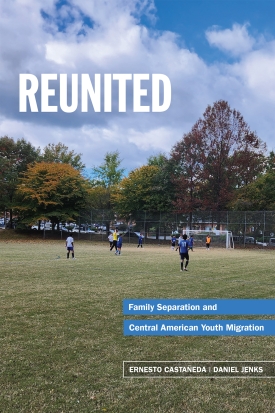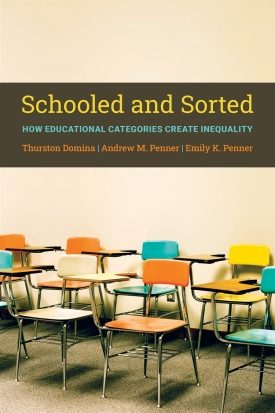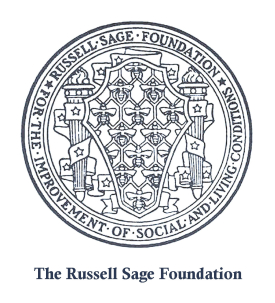The U.S. is undergoing a historic demographic shift as, collectively, Asian, Black, Latino, multiracial, and other people of color are projected to become the numerical majority. To date, most social science research has employed controlled experiments to study the response of non-Hispanic Whites to this projected change. This project will center people of color and take advantage of a natural experiment—the release of new census projections in 2023—to understand the effects of real-world exposure to racial projections on public opinion.
Deaths related to suicide, alcohol-related diseases, and drug overdoses have spiked in recent years. Journalists and scholars have speculated about the relationship between these “deaths of despair” and changes in the labor market that have made high-paying, stable work harder to find for those without a college degree.

Reunited
About This Book
“Timely, meticulously researched and argued, Reunited deftly weaves the voices of Central American youth migrants into cutting-edge scholarly arguments to produce a compelling account that is inspiring, humane, and powerful. Essential reading for scholars, students, policymakers, and anyone interested in understanding the so-called root causes of Central American migration.”
—CECILIA MENJÍVAR, Dorothy L. Meier Chair in Social Equities and professor of sociology, University of California, Los Angeles
“Reunited captures the full complexity of contemporary Central American migration to the United States, explaining both the structural and historical forces propelling it and the ways in which families are surviving in their midst. This important book humanizes one of the most politically and morally challenging issues of our time.”
—LEAH C. SCHMALZBAUER, Karen and Brian Conway ‘80, P’18 Presidential Teaching Professor of American Studies and Sociology, Amherst College
“Reunited is an essential account of the nefarious effects of inhumane U.S. immigration policy that separates Central American children from their immigrant parents. Ernesto Castañeda and Daniel Jenks offer a nuanced and compelling portrayal of the enduring toll of these separations on child well-being and family ties, as well as the challenges and emotional labor involved in ‘picking up the pieces’ once children migrate to the United States to reunite with their parents, while also suggesting reforms that would aid their integration in U.S. society.”
—CHIARA GALLI, assistant professor, Department of Comparative Human Development, University of Chicago
Over the last dozen years, an increasing number of children from El Salvador, Honduras, and Guatemala began arriving without parents at the U.S.-Mexico border. In many cases, the parents had left for the United States years earlier. In Reunited sociologists Ernesto Castañeda and Daniel Jenks explain the reasons for Central American youth migration, describe the journey, and document how minors experienced separation from their families and their subsequent reunification.
In interviews with migrant youth, their sponsors, and social services practitioners in and around Washington, D.C., Castañeda and Jenks find that these minors migrate on their own for three main reasons: gang violence, lack of educational and economic opportunity, and a longing for family reunification. The authors note that youth who feel comfortable leaving and have feelings of belonging upon arrival integrate quickly and easily while those who experience trauma in their home countries and on their way to the United States face more challenges.
Castañeda and Jenks recount these young migrants’ journey to the U.S. border, detailing the difficulties passing through Mexico, their encounters with U.S. Customs and Border Protection officials, and staying in shelters while their sponsorship, placement, and departure are arranged. The authors also describe the tensions the youth face when they reunite with family members they may view as strangers. Despite their biological, emotional, and financial bonds to these relatives, the youth must learn how to relate to new authority figures and decide whether or how to follow their rules.
The experience of migrating can have a lasting effect on the mental health of young migrants. Although Castañeda and Jenks find that Central American youths’ mental health improves after migrating to the United States, they remain at risk of further problems. They are likely to have lived through traumatizing experiences that inhibit their integration. Difficulty integrating, in turn, creates new stressors that exacerbate PTSD, depression, and anxiety. Consequently, schools and social service organizations are crucial, the authors argue, for enhancing youth migrants’ sense of belonging and their integration into their new communities. Bilingual programs, Spanish-speaking PTA groups, message boards, mentoring of immigrant children, and after-school programs for members of reunited families are all helpful in supporting immigrant youth as they learn English, finish high school, apply to college, and find jobs.
Offering a complex exploration of youth migration and family reunification, Reunited provides a moving account of how young Central American migrants make the journey north and ultimately reintegrate with their families in the United States.
ERNESTO CASTAÑEDA is director of the Center for Latin American and Latino Studies at American University.
DANIEL JENKS is a doctoral student at the University of Pennsylvania.
RSF Journal
View Book Series
Sign Up For Our Mailing List
Apply For Funding
The Black Lives Matter movement and other racial justice organizations have challenged the dominant historical narrative and advocated a new understanding of the racial struggle for civil rights. Social psychologists Rezarta Bilali and Michelle Twali will examine how racial justice activists make sense of the history of racial struggle, how it shapes their activism, and identify what aspects of the history of racial struggle the public is exposed to via social media. They will conduct focus groups and social media analysis of Twitter for their study.

Schooled and Sorted
About This Book
"This highly accessible and engaging book is rich with sociological insight. While recognizing the inevitable sorting role of schools, the authors offer a creative road map towards a more equitable future in education—and in life."
—ADAM GAMORAN, president, William T. Grant Foundation
"We all know that schools sort kids into good and bad jobs. This elegant little book reminds us that schools are also relentless categorizers inside their gates: the free-lunch kids learn they’re poor, the honors kids learn they’re special, and the ‘first years’ learn they’re far from first. Schooled and Sorted makes a brilliant case for regaining control over the categories that define our children’s lives."
—DAVID B. GRUSKY, Edward Ames Edmond Professor in the School of Humanities and Sciences and director, Center on Poverty and Inequality, Stanford University
"Schooled and Sorted makes a convincing case that it takes more than just skill-building curricula and effective teachers for a school to provide its students with ladders to the middle class. When schools also make well-intentioned efforts to boost achievement and motivate students by grouping or categorizing them, the results can be counterproductive. This book explains why and what can be done about them."
—GREG J. DUNCAN, distinguished professor, School of Education and Departments of Economics (by courtesy) and Psychology and Social Behavior (by courtesy), University of California at Irvine
We tend to view education primarily as a way to teach students skills and knowledge that they will draw upon as they move into their adult lives. However, schools do more than educate students – they also place students into categories, such as kindergartner, English language learner, or honor roll student. In Schooled and Sorted, Thurston Domina, Andrew M. Penner, and Emily K. Penner, explore processes of educational categorization in order to explain the complex relationship between education and social inequality – and to identify strategies that can help build more just educational systems.
Some educational categories have broadly egalitarian consequences. Indeed, Domina, Penner, and Penner argue that when societies enroll young people in school, making them students, they mark them as individuals who are worthy of rights. But other educational categories reinforce powerful social categories – including race, gender, and class – and ultimately reproduce social and economic inequality in society. Elite colleges, tracked high schools, and elementary school gifted programs provide not only different educational experiences, but also create merit and inequality by sorting students into categories that are defined by the students who are excluded.
Schooled & Sorted highlights that many of the decisions that define educational categories occur in school-based committee meetings and other relatively local settings. The local nature of these decisions provides many opportunities to define educational categories differently, and for school communities to bring about change.
Schooled & Sorted is an illuminating investigation into the ways sorting within schools translates into inequality in the larger world. While some educational categorization may be unavoidable, the authors suggest ways to build a more equitable system – and thus a more equitable society.
THURSTON DOMINA is Robert Wendell Eaves Sr. Distinguished Professor in Educational Leadership, University of North Carolina, Chapel Hill
ANDREW M. PENNER is a professor of sociology, University of California, Irvine
EMILY K. PENNER is associate professor of education, University of California, Irvine
RSF Journal
View Book Series
Sign Up For Our Mailing List
Apply For Funding
The concept of systemic racism—that racial bias has been embedded in structures, institutions, laws, and policies—is the subject of critical race theory (CRT) and has proven to be controversial.
How are social media users from diverse backgrounds, neighborhoods, and communities interacting about issues of race? Psychologist Jennifer Eberhardt and computer scientist Dan Jurafsky will examine the nature of online interactions about race on the neighborhood-based social networking platform Nextdoor, specifically around the issues of crime and safety, the treatment of African Americans who post about experiences of discrimination, and the impact of these posts on readers.
About This Book
This booklet discusses social case workers and how they contribute to better industrial conditions. Topics include how information spreads, investigation of industrial facts, adequate plan of treatment, the personal equipment of the case worker, health and income, health and hours of labor, appreciation of the relation between labor conditions and social conditions, and making case data accessible to inquirers.
SHELBY M. HARRISON was the director of surveys and exhibits at the Russell Sage Foundation.
Download
RSF Journal
View Book Series
Sign Up For Our Mailing List
Apply For Funding

Relief: A Primer for the Family Rehabilitation Work of the Buffalo Charity Organization Society Prepared by Its Secretary
About This Book
This booklet provides general principles for charity work. It discusses lack of male support, disability, children, volunteer visitors, churches, city aid, new applications, pensions, budgets, loans, pauperizing, and prevention.
FREDERIC ALMY was secretary of the Buffalo Charity Organization.
Download
RSF Journal
View Book Series
Sign Up For Our Mailing List
Apply For Funding
Pagination
- Previous page
- Page 6
- Next page
